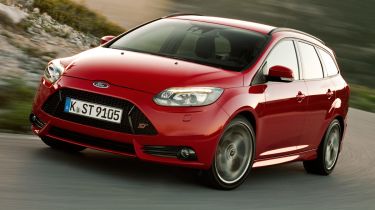Ford Focus ST Estate
The all-new Ford Focus ST is available as an estate for the first time. We drive it

The ST isn’t a replacement for the RS and in some senses it’s better than that. It isn’t eye-wateringly fast, but is quick enough and hugely enjoyable to drive. It doesn’t cost the earth and, with almost 40mpg and emissions of 169g/km, it shouldn’t be exorbitant to run. The estate adds a welcome dose of practicality and if anything, handles better and is better disguised than the slightly lairy hatchback. Is this the ultimate working man’s GT? We think so.
The hot new Ford Focus ST has got us so excited, we’ve forgotten the drawbacks. Chief among them is the tiny 361-litre boot, which makes the hatch one of the least practical load carriers.
But Ford has thought of this, and offers an estate version of the ST, providing 476 litres of load space with the rear seats up and over 1,500 litres with them folded.
The estate Focus still isn’t the last word in luggage carrying. The seats and squabs split 60:40 and the load cover works well, but there’s no split floor and nowhere to store the luggage carrier with the rear seats folded.
Still, there are some sensible options, including a lightweight luggage divider and a thick rubber tray to protect the trim from wet suits or wet dogs.
Used - available now

2020 Ford
Focus
19,280 milesManualDiesel1.5L
Cash £11,900
2022 Ford
Focus
15,007 milesManualPetrol1.0L
Cash £16,800
2022 Ford
Focus
25,596 milesManualPetrol1.0L
Cash £15,900
2020 Ford
Focus
21,749 milesManualPetrol1.0L
Cash £13,740The ST estate is mechanically identical to the hatch, and there are three specifications: ST, ST-2 and ST-3. Each is progressively better equipped, with extras like climate control and partial leather upholstery on the £24,595 ST-2 .
There are also various option packs – the most curious is the £50 door-edge protectors, which automatically deploy when the doors open, and work pretty well.
Even in a top-level ST-3 you’d be hard pressed to know you were in a fast Ford from behind the wheel, although the gorgeous Recaro seats are figure hugging and very supportive, and rear passengers get similar perches with the ST-3. On all models, the driver gets a few extra ancillary gauges on the dash top – a clever nod to performance Fords of old.
Under the bonnet is a revised version of the 2.0-litre EcoBoost turbo, which delivers 247bhp and 340Nm of torque. The twin-scroll turbo boosts hard and fast and from 2,000rpm, the torque curve is as flat as a Norfolk fen all the way to 4,500rpm. Performance and economy are identical to the hatchback’s, as are the chassis settings.
The two cars also have the same wheelbase, so the only real difference is the overall length – the estate is 204mm longer, at 4,566mm.
The EcoBoost engine doesn’t sound as rorty as the charismatic Volvo five-cylinder from the previous Focus ST, but on the move it has a similar amount of torque and feels more eager to rev. A noise generator on the bulkhead is some compensation, plus the four-cylinder’s lighter weight brings considerable benefits.
The car feels eager, and even when fully loaded, it’s a devastatingly fast cross-country tourer. The six-speed gearbox has short, stiff shifts and well spaced ratios that allow fast cruising at low engine speeds.
The ST’s MacPherson strut front and control blade independent rear suspension gets recalibrated springs, dampers and anti-roll bars. Plus, the electronic steering has a variable ratio, which helps with low-speed manoeuvring, while maintaining sensitivity at high speeds.
No, the ST isn’t as special as the old Focus RS, but the engineering love Ford has put into it makes it feel pretty tasty from the off. The steering tugs in your hands under hard acceleration, yet is accurate and full of feel.
The suspension rides the bumps firmly, but with subtlety, and body roll is superbly controlled. It’s not skate-board stiff, but is comfortable and recovers its composure quickly after bumps and turns.
This car is great fun, with astonishing grip and agility that old ST models couldn’t match. Even when you can’t imagine pushing harder, the torque vectoring and anti-understeer systems simply pull the nose through the turns. And the brakes are powerful, with a linear feedback at the pedal.







